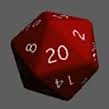 This month we’ve discussed great games that inspire, games that highlight effective storytelling, or that identify pitfalls in the creative process. We’ve also discussed some of the dangers of trying to port game scenarios directly into book form (review that excellent post here).
This month we’ve discussed great games that inspire, games that highlight effective storytelling, or that identify pitfalls in the creative process. We’ve also discussed some of the dangers of trying to port game scenarios directly into book form (review that excellent post here).
I’m going to visit that topic from a slightly different angle and discuss the effectiveness of finding avenues for creative input. It’s hard to build a great story, and harder still if we try to do it in a vacuum. Utilizing creative input sources can prove effective in developing foundational concepts for your story. The goal is not to try writing a book directly from a game scenario, particularly if it pulls in any material that may be copyrighted elsewhere. However, it is possible to utilize a RPG or other creative input source to explore some of the general concepts you might be kicking around as the foundation of a story.
For example, if you want to flesh out a new magic system, inviting your gaming friends to utilize that magic system in a game scenario can really help. They’ll try to break the rules, and they’ll try to use it in ways you never expected. The experience will force you to think deeper and broader than you might have on your own, and lay down rules and boundaries you had not realized you needed. This is particularly useful if you don’t have someone who makes a good sounding board to brainstorm ideas and plumb the depths of your new concept.
You can also explore other aspects of the world building in a game. What are the nations and races that exist in this world? Do they get along? What motivates them? What do people eat? What kind of money do they use?
 In my family we play a customized RPG that utilizes only one 20-sided die for all decisions. It removes a lot of the technical hassle of similar games and relies more on the storytelling skill of the person leading the game. It’s also an excellent creative workout routine. I rarely plan out the details of a game beforehand, so am forced to come up with each element in a just-in-time delivery sort of way. I’ve found it helps break down creative barriers and triggers some exceptionally creative moments.
In my family we play a customized RPG that utilizes only one 20-sided die for all decisions. It removes a lot of the technical hassle of similar games and relies more on the storytelling skill of the person leading the game. It’s also an excellent creative workout routine. I rarely plan out the details of a game beforehand, so am forced to come up with each element in a just-in-time delivery sort of way. I’ve found it helps break down creative barriers and triggers some exceptionally creative moments.
I’ve used this process as a way to explore multiple story concepts. Many of them prove mediocre or uninspiring, so we drop those and try something different. A few have resulted in ideas with lots of potential. Those I set aside for later exploration, or launch secondary game scenarios to consider further.
Once I’ve got what I need, I throw away the specifics of the game, including the characters, and start building my story from scratch – drawing upon the foundational concepts we explored through the game.

But RPG gaming is not the only creative input I use, and it’s not even my most productive. Even better is good old storytelling. In our family we tell a lot of stories, and I’ve used that verbal story time to develop magic systems and explore plot concepts with my kids. It’s proven highly effective. Kids (2 of mine are teen-agers now) provide instant feedback, and they are brutal critics. If an idea isn’t working, I know about it instantly. On the other hand, if a story generates lots of enthusiasm from them, I might be on to something.
The danger there, just as with using RPG games, is to recognize that the novel you write will not be the same as the game (or verbal story). A couple years ago, I spent a lot of time developing a story line with my kids. They actually came up with the original magic system idea, which I then fleshed out and used to launch into a series of stories where we explored many other aspects of the world building. The resulting story proved so engaging that I decided to write a book based on all the material we produced.
At first I tried to follow the story line we’d developed, since we were all so enthusiastic about it. However I quickly ran afoul of the hazards lurking down that road. After those hard-learned lessons, I threw away that unproductive plotline and made a hard break – the story would not be a novelization of our hours of storytelling. Instead, I would craft a novel from the ground up, building upon some of the foundational elements we explored in that storytelling, but the plot and characters were entirely new. The resulting novel is a YA fantasy titled Set In Stone, which is now in the hands of my agent. Hopefully we’ll find a home for it soon.
Take Away: Use any creative avenue available to you to explore creative ideas, but remember the limits of what you can accomplish. Take the foundational elements, strip out the rest, and go build a great novel.
Where else do you turn for creative input to explore story concepts as you begin working on a new novel?

Pingback: Exploring Story Concepts Prior to Writing « Blog « Frank Morin